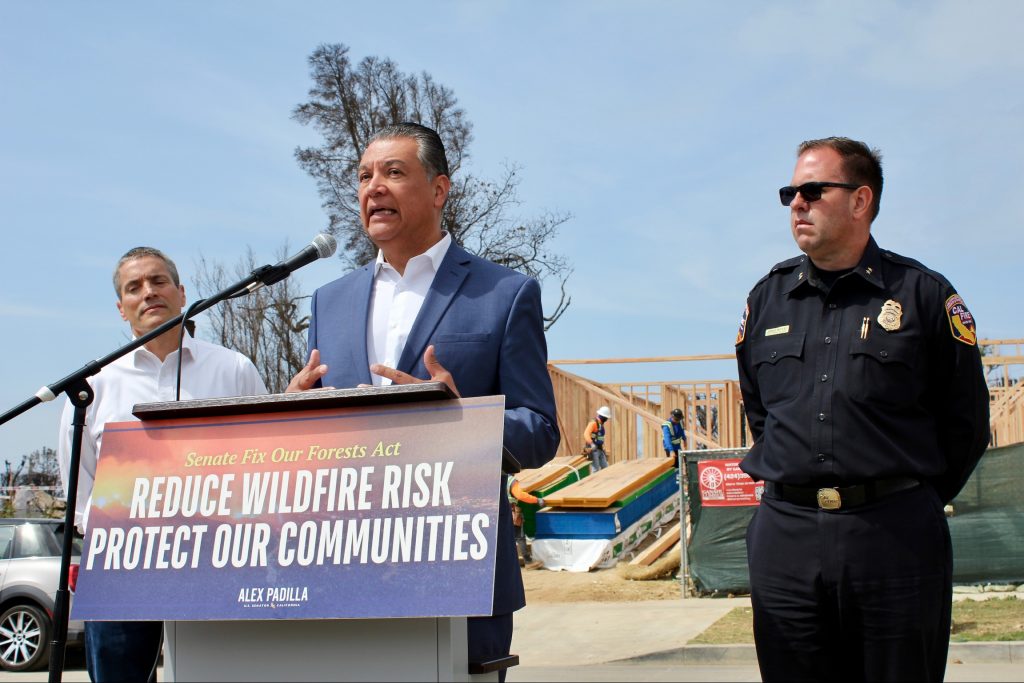Padilla Joins Federal and State Emergency Officials to Survey Pacific Palisades Fire Recovery Area; Highlights Bipartisan Legislation to Address Wildfire Risks

LOS ANGELES, CA — Just over 100 days after the Los Angeles fires first ignited, U.S. Senator Alex Padilla (D-Calif.) and California Natural Resources Secretary Wade Crowfoot joined federal and state emergency officials for a tour today of the Pacific Palisades fire recovery area led by the Federal Emergency Management Agency (FEMA). The tour consisted of a visit to businesses and residences impacted by the Pacific Palisades fire — with officials from FEMA, the U.S. Army Corps of Engineers (USACE), CAL FIRE, and the California Governor’s Office of Emergency Services (Cal OES) — followed by a press conference at a cleared debris site where Padilla discussed his new bipartisan legislation to address wildfire risks.
In the aftermath of the devastating Southern California fires, Padilla’s Fix Our Forests Act would help combat catastrophic wildfires, restore forest ecosystems, and make federal forest management more efficient and responsive. The comprehensive Senate bill reflects months of bipartisan Senate negotiations to find consensus on how to best improve forest management practices, accelerate processes to protect communities, advance watershed restoration, and strengthen partnerships between federal agencies, states, tribes, and private stakeholders. The Senate version of the bill would also bolster coordination efforts across agencies through a new Wildfire Intelligence Center, which would streamline the federal response and create a whole-of-government approach to combating wildfires.
A list of Senate Fix Our Forests Act provisions particularly impactful for California is available here. A one-pager on the bill is available here.
“As thousands of Los Angeles families look at a long road to recovery ahead, we need to do everything in our power not just to rebuild, but to prevent devastation from future wildfires,” said Senator Padilla. “That’s why with these LA communities in mind, I convened a bipartisan group of Western Senators to reassess how we prevent and respond to wildfires. Our Senate version of the Fix Our Forests Act would increase the speed and scale of our wildfire prevention and mitigation efforts by expediting the removal of hazardous fuels, building ‘fuel breaks’ to stop mega wildfires, and creating a National Wildfire Intelligence Center to streamline federal response. We’re breaking through this harsh political climate with bipartisan solutions to both fight deadly wildfires and prevent even more greenhouse gas emissions — we can’t take this opportunity for granted.”
“The bipartisan Fix Our Forests Act removes barriers and builds on California’s progress to accelerate more work on federal lands, faster,” said California Natural Resources Secretary Wade Crowfoot. “As an all-lands, all-hands approach, it is one more tool in the arsenal against the threat of wildfires. As we enter peak fire season, reducing catastrophic wildfire risk requires everyone to do their part.”
“Across California, we are working year-round to reduce wildfire risk and enhance prevention efforts, and we are seeing results,” said Josh Nettles, CAL FIRE Assistant Region Chief. “Now by enhancing interagency coordination and promoting fire-resistant building methods and defensible space practices, the Fix Our Forests Act will help protect communities in the wildland-urban interface and elsewhere.”
The American West has long been prone to wildfires, but climate change, prolonged drought, and the buildup of dry fuels have increasingly intensified these fires and extended fire seasons. Wildfires today are more catastrophic — growing larger, spreading faster, and burning more land than ever before. Nationwide, total acres burned rose from 2.7 million in 2023 to nearly 9 million in 2024, a 231 percent increase.
California averages more than 7,500 wildfires a year. Not including the recent Los Angeles fires, six of the top 10 most destructive fires, three of the top five deadliest fires, and all of the state’s nine largest fires have burned since 2017. The status quo is simply unsustainable, and responding to the scale and magnitude of the crisis on the ground is essential to keeping California communities safe.
Additionally, wildfires release carbon dioxide and other greenhouse gas emissions that accelerate climate change. California’s 2020 fire season, the worst on record, emitted enough greenhouse gases to erase nearly two decades of progress on emissions reductions in California. Addressing this wildfire emergency is critical to ensuring that our climate progress is not undermined by the devastating impacts of these fires.
In the aftermath of the devastating Southern California fires, Senator Padilla has introduced more than 10 bills to help prevent and respond to future disasters. In February, Padilla introduced bipartisan legislation to create a national Wildfire Intelligence Center to streamline federal response and create a whole-of-government approach to combat wildfires. He also announced a package of three bipartisan bills to bolster fire resilience and proactive mitigation efforts, including the Fire-Safe Electrical Corridors Act, the Wildfire Emergency Act, and the Disaster Mitigation and Tax Parity Act. In January, Padilla introduced another suite of bipartisan bills to strengthen wildfire recovery and resilience, including the Wildland Firefighter Paycheck Protection Act, the Fire Suppression and Response Funding Assurance Act, and the Disaster Housing Reform for American Families Act. Additionally, earlier this month, he introduced the FEMA Independence Act, bipartisan legislation to restore the FEMA as an independent, cabinet-level agency and improve efficiency in federal emergency response efforts.
Senator Padilla also visited Altadena last month, joining Senator Cory Booker (D-N.J.), FEMA, local leaders, and representatives from the Small Business Administration, Environmental Protection Agency, and USACE for a tour and briefing on cleanup and recovery efforts in the aftermath of the Eaton Fire.
Video of today’s press conference is available here, and can be downloaded here.
Additional photos from today’s tour are available here.
###